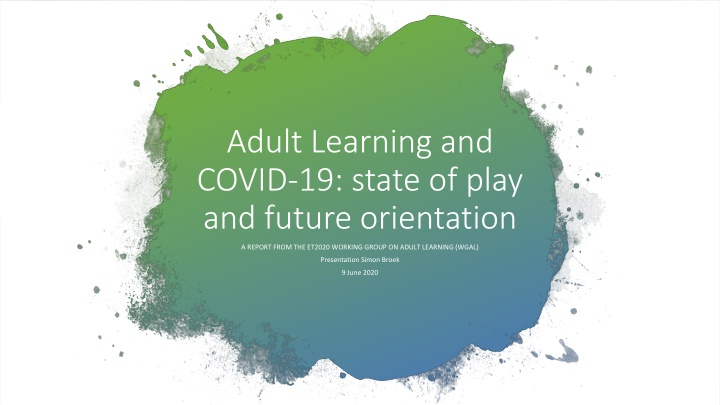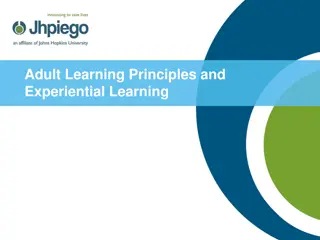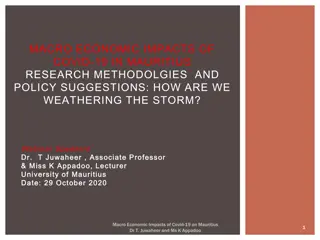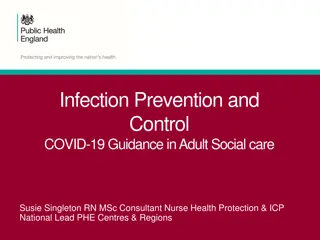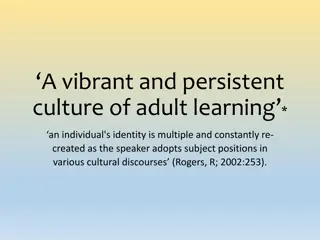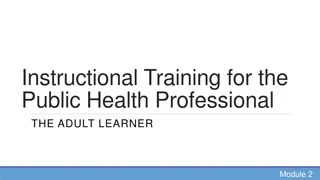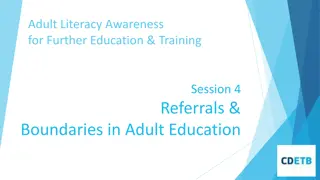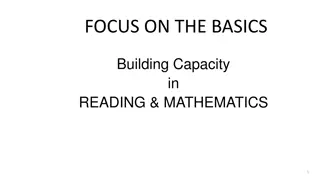Adult Learning and COVID-19: Impacts and Future Perspectives
This report discusses the impacts of the COVID-19 crisis on adult learning, explores the role of adult learning in crises, and provides insights to support discussions at national and European levels. It covers effects of COVID-19, coping mechanisms in the adult learning sector, and early scenarios for the post-COVID-19 world, emphasizing the need for skills like adaptability and resilience. Prepared by the ET2020 Working Group on Adult Learning, this report aims to shed light on the evolving landscape of adult education in the face of the pandemic.
Download Presentation

Please find below an Image/Link to download the presentation.
The content on the website is provided AS IS for your information and personal use only. It may not be sold, licensed, or shared on other websites without obtaining consent from the author.If you encounter any issues during the download, it is possible that the publisher has removed the file from their server.
You are allowed to download the files provided on this website for personal or commercial use, subject to the condition that they are used lawfully. All files are the property of their respective owners.
The content on the website is provided AS IS for your information and personal use only. It may not be sold, licensed, or shared on other websites without obtaining consent from the author.
E N D
Presentation Transcript
Adult Learning and COVID-19: state of play and future orientation A REPORT FROM THE ET2020 WORKING GROUP ON ADULT LEARNING (WGAL) Presentation Simon Broek 9 June 2020
Aim of the report Provide insights into the impacts of the COVID-19 crisis on adult learning; Provide insights into the role adult learning can play within the context of this crisis (and future or similar crises); Provide information and reflections regarding these aspects, to feed the discussion(s) at Member State and European level
prepared by the ET2020 Working Group on Adult Learning desk research (on the COVID-19 crisis, adult learning, future scenario s, etc.) written input from the members of the WGAL (AT, BE FR, BG, CH, CY, CZ, DE, EE, ES, FR, HR, HU, IE, IT, LU, LV, NL, NO, PT, SE, SI, and TK) Methodological approach Structure of the report 1. Background and aim of the report 2. What are the effects of COVID-19? Setting the scene 3. How is the adult learning sector coping with COVID- 19? 4. What is the role of adult learning in a COVID-19 affected world? 5. Conclusions and considerations
2. What are the effects of COVID-19? Setting the scene COVID-19 affecting countries and their societal systems Impacts on all areas (health care systems, economy, labour markets, ET systems, social security systems, political/governance) Education systems (overall) are changing, rapidly, while transitioning to distant learning; even finding solutions for classes that are traditionally considered most physical in nature digital literacy (and the use of digital tools), self-management (and self-reliance), time-management, flexibility (in planning, workplace, etc.), COVID-19 affecting individuals The extent to which individuals are affected, is inherently linked to their (demographic) characteristics at the start of the crisis. the need of individuals to adapt to the new situation in various areas of their life, brings to light an increased need for various skills (especially soft skills). adaptability, resilience, creativity and ingenuity, collaboration, communication, and Early scenarios for the COVID-19 affected future COVID-19 crisis will undoubtedly lead to economic recession(s) at a global scale those at higher risks will be hit the hardest, and will have the least possibilities to overcome the challenges they face. emotional intelligence.
3. How is the adult learning sector coping with COVID 3. How is the adult learning sector coping with COVID- -19? 19? Adult learning provision continued, be it online The importance of basic skills; especially language, digital and critical thinking Steep learning curve and a sense of solidarity Immediate responses work on many of the emerging challenges Responses do not solve the most persisting challenges
The role of adult learning 4. What is the role 4. What is the role of adult learning of adult learning in a COVID in a COVID- -19 affected world? affected world? Future of adult learning delivery: online, cooperative, tailored and focusing on empowering individuals and communities 19
1. COVID-19 affected all economic sectors and the society as a whole, but affected the vulnerable groups the most. 2. The crisis showed the importance of basic skills (literacy and digital skills); critical thinking skills and learning to learn skills for individuals. Furthermore, they showed that individuals and communities should be able to have a minimum level of self-sufficiency. Conclusions on the role of adult learning in a COVID-19 affected world (1/3) 3. Adult learning systems have been heavily impacted by the COVID-19 crisis (getting organised online; reaching out to adult learners; and ensuring that adult educators have the right skills and equipment). However, adult learning systems have largely managed to respond quickly and effectively to the challenges posed.
4. The immediate responses from the adult learning system show a weakness in the ability to reach those that matter the most: specific vulnerable groups. Also, on the longer term there is a need to substantially improve the quality of the online delivery. Conclusions on the role of adult learning in a COVID-19 affected world (2/3) 5. In a COVID-19 affected future, adult learning systems have an important role to play in terms of - adjusting economic sectors; - supporting the unemployed; - supporting the completion of the digital transition; - involving all vulnerable groups.
6. For this however, adult learning systems need to strengthen on online learning; cooperation; tailoring and self-organising principles and empowerment. Conclusions on the role of adult learning in a COVID-19 affected world (3/3) 7. All in all, effective adult learning systems are essential to secure an equal, just and inclusive recovery from the COVID-19 crisis and to facilitate the manifold transitions of people in work, social life and personal life. This requires substantial changes of how adult learning systems are organised, coordinated, financed and how they offer their learning and reach out to vulnerable groups.
Consideration 1: At national level, it can be considered to develop a national adult learning sector-wide strategy. Considerations on what is needed for adult learning to fulfil its essential role (1/2) This to better position adult learning and to make it future-proof and able to support the society and economy to function in a COVID-19 affected future. This sector-wide approach should ensure cooperation; secure effective skills intelligence; tailor to needs; and reach out to all.
Consideration 2: At the European level, a new action plan could be drafted as a follow up of the renewed European agenda for adult learning (EAAL). Considerations on what is needed for adult learning to fulfil its essential role (2/2) It is important that at European level such a plan is developed to encourage Member States to continue working on adult learning. it emphasises the importance of the sector to ensure equal and inclusive societies and labour markets and to ensure innovation and competitiveness of the economies. As in adult learning, also at European level, the countries being hit hard the most, also have most challenges to overcome the crisis and hence need for a quality adult learning system. The crisis therefore asks for a European level response and European level solidarity, at least when it comes to find common responses and learn lessons from countries experiences.
